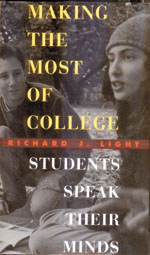Q&A with Richard Light
Q: When you started this research in 1986, did you have any idea what you’d find?

Your book is based on nearly 15 years of detailed interviews with students. As a researcher, how do you know when you’ve collected enough data?
A: Your question is one that a generation of doctoral students has written Ph.D. theses about. The facile answer is, the more evidence the better. Yet we thought about this question in a specific way. We decided that rather than having one person interview, say, 500 students, it was far better to have 10 people each do 50. Why? Because if 10 interviewers independently conclude that their discussions with students reveal XYZ, then you can reasonably assume that XYZ is roughly right. I have quite a lot of confidence in the findings, and, remember, I teach statistics courses here!
Q: Well, let’s talk about that. You use a lot of direct quotations from students to illustrate your points, and you made an interesting statement in the book that “It is a pleasure for me, as a professional statistician, to find circumstances in which detailed verbal summaries yield clearer interpretations than summary indexes.” Isn’t that a form of heresy for a statistician?
A: Do you remember that some years ago a little girl in Texas fell down a well? For about three evenings, each evening on the nightly news, the lead story was how the girl’s mother was in contact with the girl stuck in the well, and the rescuers were making progress? I bet many people remember that story, and if I ask you the little girl’s name, you might even remember that it was Jessica.
Here’s the point: increasingly, in teaching statistics, I have come to appreciate that while quantitative evidence is great, the fact is that human stories often carry a special punch. For example, if the nightly news headlines had been “National Safety Council reports that 246 children fell into wells last year,” neither you nor I nor anyone else would remember that.
Q: You’re giving all royalties from the book to undergraduate scholarships. That’s potentially a lot of money, and after so much work. Why did you make that decision?
A: Two reasons. First, students have been incredibly generous with their time. I didn’t pay them anything. And second, the president’s office has supported my expenses for several years. This is a way to repay students and the institution. This College is a special place, and part of its uniqueness is the fact that we can admit remarkable students and then facilitate their coming here regardless of their family’s financial circumstances. There are fewer than a dozen colleges in the entire country that do this. We are all privileged to be here, and I don’t want to forget that.




